Speeches HQ

6 Recognition Ceremony Speech Samples
Are you searching for the right words to use at a recognition ceremony? Whether you’re planning an employee appreciation event, an academic awards night, or a community service celebration, writing the perfect speech can be tricky. You want to balance heartfelt appreciation with professional tone, while keeping your audience interested.
This collection of speech samples will help you get started. From short remarks to longer addresses, these examples provide a solid base for your own speech. Let’s look at some inspiring ways to honor achievements and encourage others to aim high.
Recognition Ceremony Speech Samples
Here are six powerful speech samples to help you excel at your next recognition event.
1. Celebrating Team Excellence
Ladies and gentlemen, esteemed colleagues, and honored guests,
We’re here to celebrate an incredible achievement. Our marketing team hasn’t just met their goals; they’ve far exceeded them. During a year full of obstacles, they’ve shown us what real dedication and innovation look like.
To our marketing experts: your creativity is outstanding. You’ve turned challenges into chances, boosting our brand in ways we never expected. Your campaigns didn’t just reach people; they affected emotions and shifted perspectives.
But it’s not just about the impressive numbers. It’s about your attitude. The late nights, the brainstorming sessions that led to breakthroughs, the way you’ve backed each other up – that’s what makes you special.
You’ve shown that together, we can accomplish anything. Your success isn’t just good for our company; it shows how powerful teamwork and determination can be.
As we recognize your accomplishments today, know that you’ve set a new bar for excellence. You’ve shown us all what’s possible when talent meets hard work.
To each marketing team member: be proud of what you’ve achieved. Your efforts will benefit our company for a long time. You haven’t just met expectations – you’ve redefined them.
Let this recognition motivate you to reach even greater heights. You’ve proven you have the skills to excel, innovate, and lead. Keep this momentum going. Use it to inspire yourselves and others.
Thank you for your outstanding work. Your success is our success, and we’re all better off with you on our team. Congratulations again on this well-deserved recognition.
— END OF SPEECH —
Commentary: This speech celebrates the achievements of a marketing team. It’s suitable for corporate events, annual meetings, or department-specific celebrations. The tone is motivational and appreciative, highlighting both individual and collective accomplishments.
2. Honoring Academic Excellence
Good evening, students, faculty, and families,
Tonight, we’re celebrating more than just good grades. We’re celebrating the joy of learning, the pursuit of knowledge, and the promising futures ahead for our award recipients.
To those receiving awards: your achievements are truly impressive. You’ve shown exceptional commitment to your studies, pushing yourselves to excel in ways that inspire us all. But grades and honors are just part of your story.
What really sets you apart is your curiosity, your willingness to ask tough questions, and your drive to find answers. You’ve seen challenges as chances to grow. You’ve helped your classmates, contributing to a learning community that makes our school special.
Parents and guardians, this is your moment too. Your support, encouragement, and sacrifices have played a big part in the success we’re celebrating tonight. Thank you for being the foundation that made these achievements possible.
To our faculty: your guidance, patience, and love for teaching have been crucial. You’ve done more than just share information; you’ve sparked a love for learning that these students will carry throughout their lives.
Award recipients, as you move forward, keep this in mind: the skills and attitude that brought you here will help you in all parts of life. Your ability to learn, adapt, and keep going will be your greatest strengths.
Tonight marks an important point, but it’s also a beginning. Let this recognition fuel your ambitions and inspire you to reach even higher. The world needs your talents, your ideas, and your leadership.
Congratulations on your well-deserved awards. We’re excited to see what you’ll do next.
Commentary: This speech is ideal for academic award ceremonies, honoring students’ scholastic achievements. It acknowledges the support of family and faculty while encouraging students to view their success as a stepping stone to future accomplishments.
3. Community Service Awards
Friends, neighbors, and dedicated volunteers,
Take a look around this room. What do you see? I see the spirit of our community. I see people who give their time, their energy, and their hearts to make our town better for everyone.
Today, we’re here to say thank you. Thank you for the many hours you’ve spent at food banks, in classrooms, at animal shelters, and in so many other places where you were needed. Your commitment to service has affected lives in ways you might never fully realize.
To our award recipients: your actions show the best of human nature. You saw needs in our community and you stepped up to help. You didn’t do it for recognition or praise. You did it because you care.
Your selflessness spreads. Every person you’ve helped, every life you’ve touched, is now more likely to help others in turn. You’re not just fixing problems; you’re creating a culture of kindness and compassion.
But let’s be clear – this recognition isn’t the end of anything. Instead, let it be a spark. A spark that ignites even more passion for service in our community.
To everyone here: let’s follow the example of these outstanding individuals. Whether you can give an hour a week or a day a month, your contribution matters. There’s always more to be done, more lives to touch, more positive change to create.
Award recipients, you’ve shown us what’s possible when we join forces for the greater good. You’ve reminded us that the strength of our community lies in the hearts of its people.
As you receive your awards today, know that they represent much more than your individual acts of service. They stand for the hope you’ve given, the lives you’ve changed, and the example you’ve set for all of us.
Thank you for your dedication, your compassion, and your steady commitment to making our community a better place. Congratulations on this well-deserved recognition.
Commentary: This speech is perfect for community service award ceremonies or volunteer appreciation events. It emphasizes the impact of volunteerism and encourages continued engagement in community service.
4. Employee of the Year Recognition
Good afternoon, everyone.
Today, we’re here to celebrate someone truly special – our Employee of the Year. This award represents more than just excellent performance; it embodies the values and spirit that make our company great.
[Employee Name], your contributions over the past year have been remarkable. You’ve consistently gone above and beyond, not just in meeting your targets, but in boosting the performance of your entire team.
Your colleagues describe you as innovative, always ready with fresh ideas to tackle problems. They talk about your willingness to help, even when you’re already busy. Your positive attitude, even during stressful times, has inspired us all.
But what really makes you stand out is your commitment to our company’s mission. You don’t just do your job; you live our values every day. Your work has directly contributed to our success, helping us reach new milestones and set higher standards.
[Employee Name], as you accept this award, know that it comes with the sincere appreciation of everyone here. You’ve shown us what excellence looks like, and you’ve raised the bar for all of us.
To everyone else: let’s think about what we can learn from [Employee Name]’s example. How can we bring that same level of dedication, innovation, and teamwork to our own roles?
[Employee Name], congratulations once again on being our Employee of the Year. We’re lucky to have you on our team, and we’re excited to see what you’ll accomplish next.
Commentary: This speech is tailored for an Employee of the Year award ceremony. It highlights the recipient’s specific contributions while also motivating other employees to strive for excellence.
5. Lifetime Achievement Award Presentation
Distinguished guests, colleagues, and friends,
Today, we have the honor of recognizing a true pioneer in our field. [Recipient’s Name] has spent over four decades pushing the limits of what’s possible in [field/industry].
[Recipient’s Name], your career has been extraordinary. From your early days as a young [profession] to becoming a leading voice in our industry, you’ve never stopped learning, growing, and innovating.
Your groundbreaking work on [specific achievement] changed how we approach [related area]. You’ve written books that every aspiring professional in our field must read. Your research has opened new paths of exploration that will benefit generations to come.
But your influence goes far beyond your professional achievements. You’ve mentored countless individuals, including me. Your generosity in sharing your knowledge, your patience in guiding others, and your constant support for new talent have shaped the careers of so many people in this room.
You’ve also been a strong advocate for [relevant cause/issue], using your influence to drive positive change in our industry and beyond. Your commitment to ethics and integrity has set a standard for all of us to follow.
Colleagues, when we look at [Recipient’s Name]’s career, we see a blueprint for excellence. We see the power of curiosity, the importance of persistence, and the impact one dedicated individual can have on an entire field.
[Recipient’s Name], this Lifetime Achievement Award recognizes your lasting legacy. You’ve not only contributed to our field; you’ve fundamentally changed it. Your work will continue to influence and inspire far into the future.
As you accept this award, please know that it comes with the deepest respect and gratitude from all of us. Thank you for your invaluable contributions, for the paths you’ve cleared, and for setting an example that will guide our industry for years to come.
Ladies and gentlemen, please join me in congratulating [Recipient’s Name] on this well-deserved Lifetime Achievement Award.
Commentary: This speech is designed for presenting a Lifetime Achievement Award. It’s suitable for industry conferences, professional association meetings, or retirement celebrations. The tone is respectful and appreciative, highlighting the recipient’s career-long impact.
6. Recognizing Innovative Contributions
Good evening, innovators and change-makers.
Innovation – we hear this word often, but rarely do we see it demonstrated as impressively as we have in the work of [Recipient’s Name].
[Recipient’s Name], your project [Project Name] has done more than solve a problem; it’s opened up a whole new range of possibilities. You saw a challenge that many had accepted as unsolvable, and you refused to accept that limit.
Your approach was unusual, even risky. You combined technologies in ways never tried before. You brought together experts from different fields, creating a team that could examine the problem from every angle. And when you faced setbacks, you treated them not as failures, but as useful information guiding you toward the solution.
The result? A breakthrough that has [specific impact of the innovation]. The effects of your work extend far beyond our company. You’ve started a chain reaction that will drive progress across our entire industry.
But innovation isn’t just about the end result. It’s about the journey, the process, the mindset. [Recipient’s Name], throughout this project, you’ve shown the spirit of innovation that we aim to foster here.
You’ve proven that with creativity, persistence, and a willingness to question accepted ideas, we can achieve things once thought impossible. You’ve reminded us how important different viewpoints and teamwork are in creating breakthrough ideas.
To everyone here tonight: let [Recipient’s Name]’s achievement inspire you. What seemingly impossible problem will you tackle? What common belief will you challenge? How will you push the boundaries of what’s possible in your own work?
[Recipient’s Name], as you accept this award for Outstanding Innovation, know that you’re receiving more than just recognition for a successful project. You’re being honored for embodying the innovative spirit that will propel our company – and our industry – into the future.
Congratulations on this well-deserved recognition. We’re eager to see what groundbreaking ideas you’ll bring to life next.
Commentary: This speech is ideal for recognizing innovative contributions within a company or industry. It’s suitable for R&D award ceremonies, tech industry events, or any occasion celebrating breakthrough achievements. The tone is enthusiastic and forward-looking, emphasizing the broader impact of the innovation.
Final Thoughts
Recognition ceremonies are essential for acknowledging achievements, boosting morale, and inspiring future accomplishments. The speech samples provided here offer a starting point for writing your own effective addresses for various recognition events.
Keep in mind, the most powerful recognition speeches feel genuine and personal. Use these samples as inspiration, but don’t be afraid to add your own style. Include specific details about the recipients’ achievements and how their work has made a difference. Speak honestly, and your words will connect with both the honorees and the audience.
By celebrating others’ successes, you’re not just recognizing past achievements – you’re setting the stage for future greatness. So, take these examples, adapt them to fit your needs, and get ready to deliver a speech that will make a lasting impression on everyone who hears it.

Award Speech
Award speech generator.
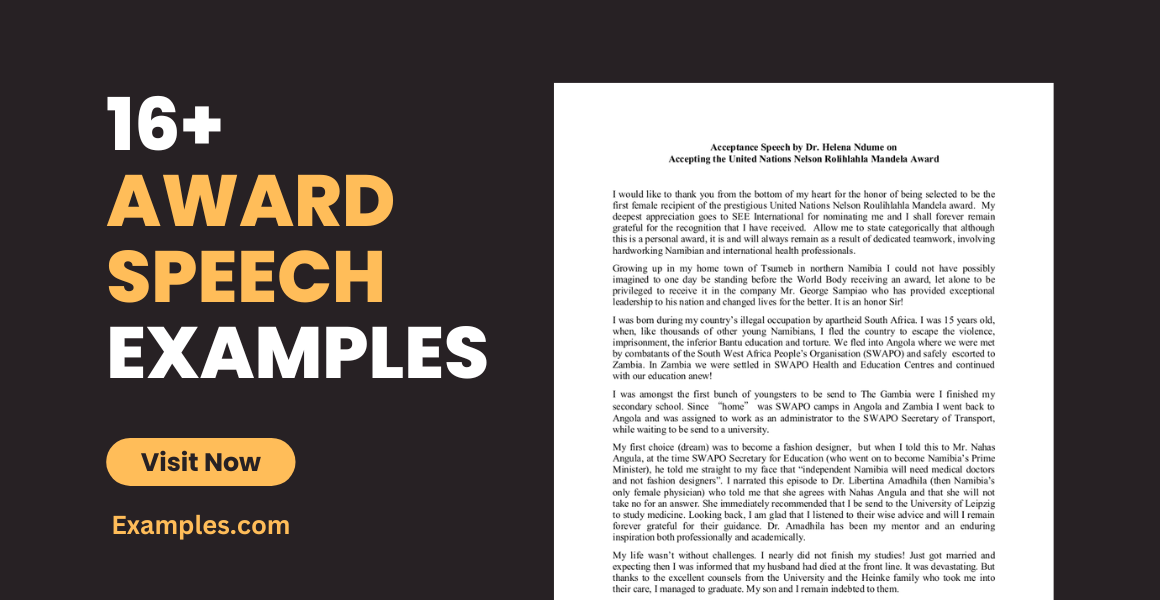
You may have already seen on television or have seen it right before your eyes that when someone would give and receive an award, they would say more than just a word of thanks in front of an audience. The speech they deliver is called as an award acceptance and award presentation speech. When it is your time to receive an award, you might have a difficulty in writing your award acceptance speech and the same thing goes when you would be awarding someone. This article gives you ten award acceptance and ten awards presentation speech examples that can help you in creating your own speech for one of your most memorable moment of your life.

Award Acceptance Speech Sample
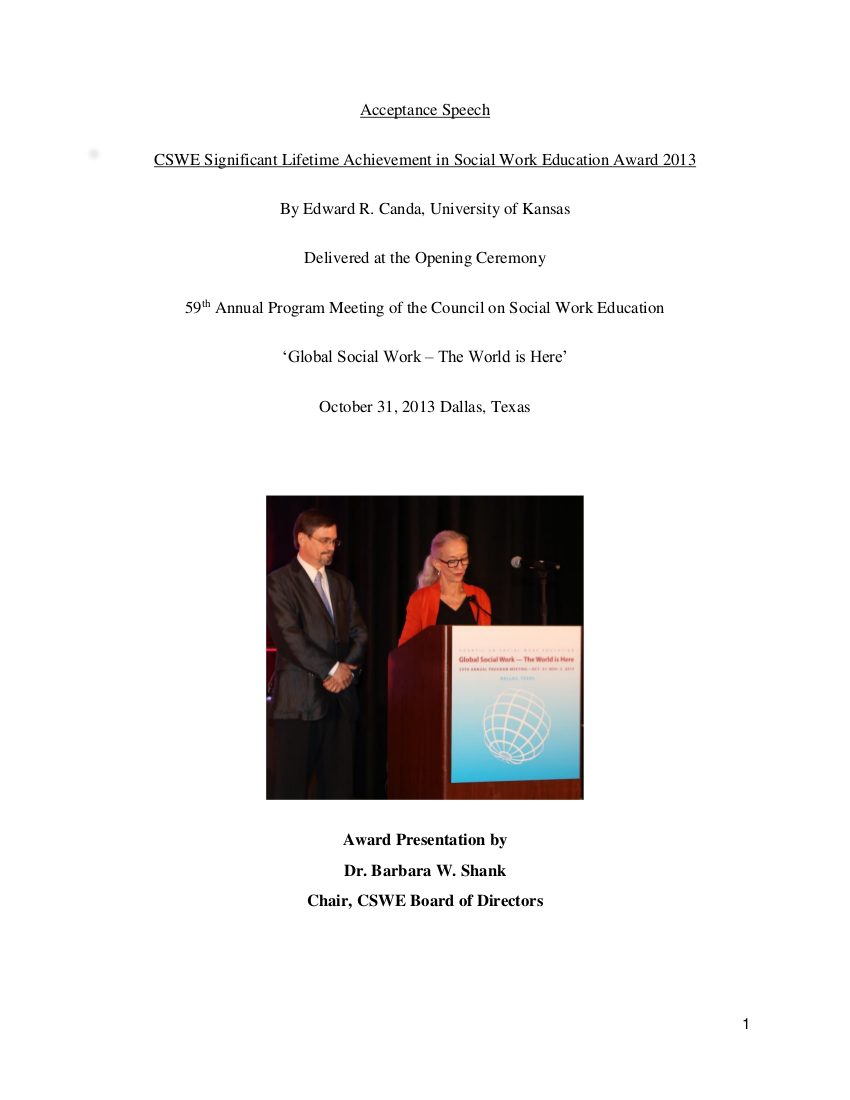
Size: 206.0 KB
Award Acceptance Speech
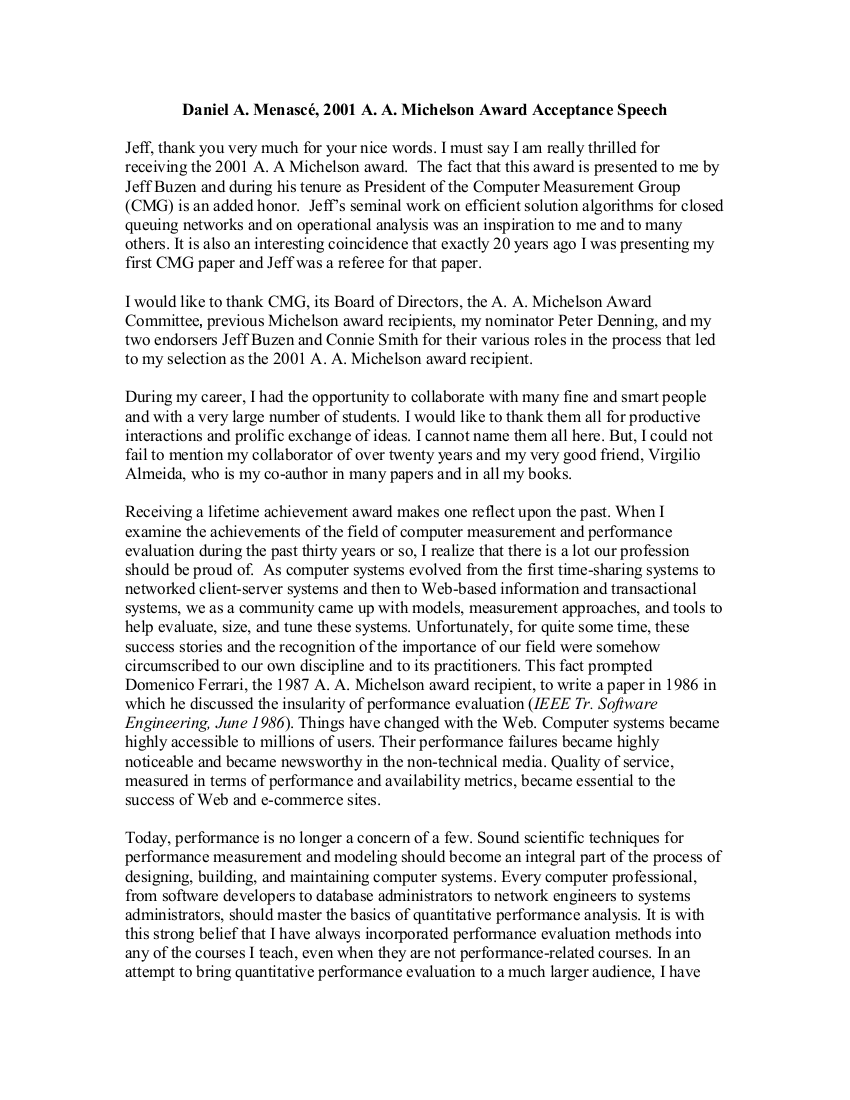
Size: 88.1 KB
Mandela Award Recipient Speech
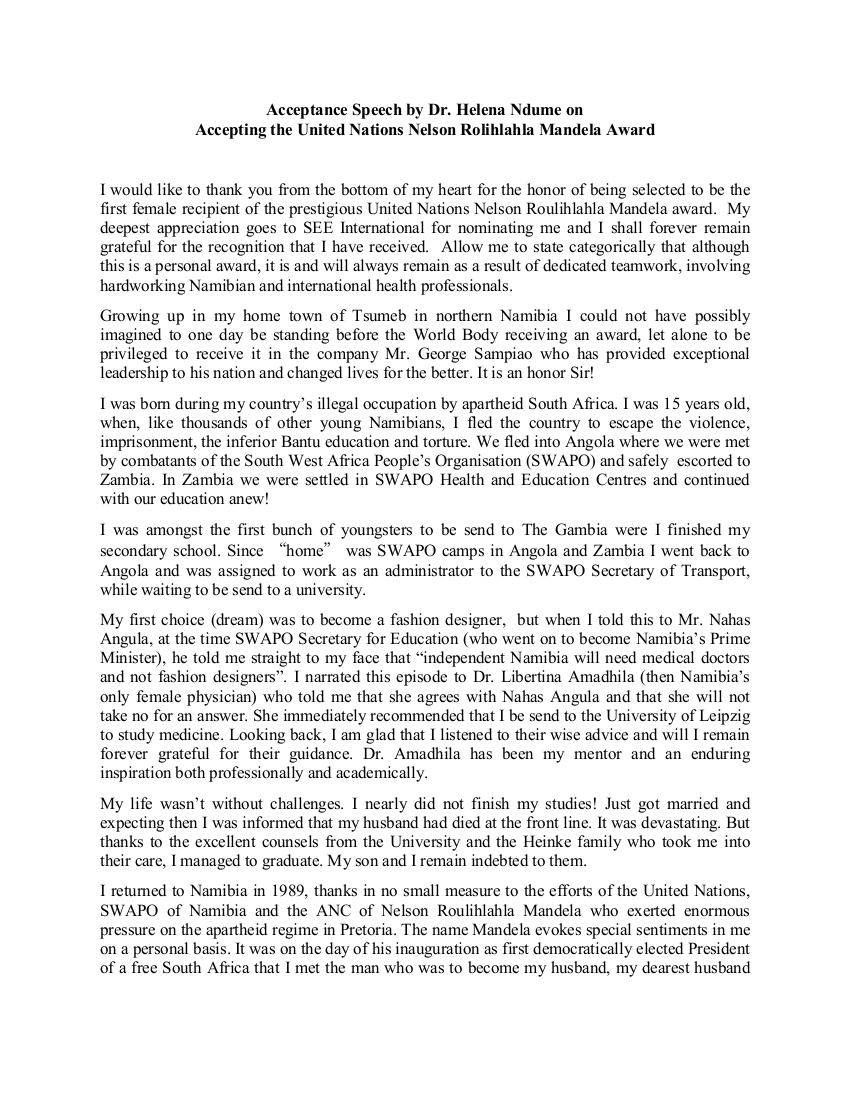
Size: 96.9 KB
Wilder Award Acceptance Speech
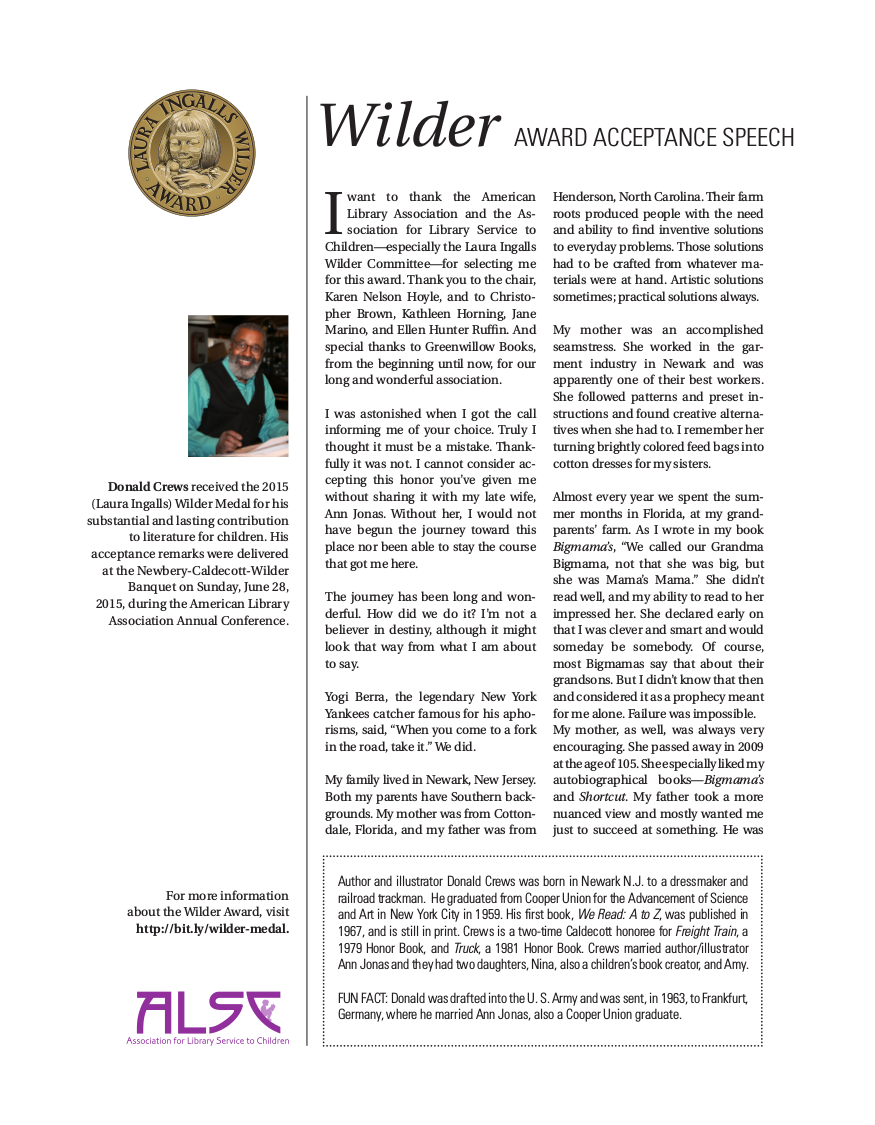
Size: 1.4 MB
Steps on Writing for Your Award Presentation Speech
Before the recipient of an award could receive his or her award, someone would be presenting the award first. If you are assigned to deliver an award presentation speech and that you do not know where to begin, make use of this simple steps to guide you in writing and preparing for your award presentation speech to help you get started.
1. The Introduction
In the introduction part of your speech , you can present both of the award and the recipient of the award. For the award, you can make a brief statement of the category and for the recipient of the award, you can introduce him or her in a mysterious fashion like you would be describing the person first, what he or she does that could or could not be related with the award he or she is going to receive. Make sure that you would keep the introduction part of your speech brief and simple but it would already build up the framework of your entire award presentation speech.
2. The Body of the Speech
It is in the body of the speech that you would be further describing the award and what were the requirements for achieving the ward. This is also the part where you would e introducing more in-depth information about the recipient of the award and this is finally the part where you would be mentioning the recipient of the award. You can also include mentioning the list of the other awards that the recipient has received. There are some that we call a veteran in receiving awards that he or she has a lot of awards received in his or her lifetime that mentioning their long list of awards might take up the entire awards ceremony. That is why you have to make sure that you are only choosing the significant awards that he or she has received and it is suggested that the ones worth mentioning are the awards that are similar or close to what the awardee will be receiving in the current awarding ceremony.

3. The Conclusion of the Speech
The main purpose of the conclusion of your award presentation speech should only be one thing and that is to induce a sound of applause from your audience to welcome the recipient of the award on stage.
Award Acceptance Speeches
Education award acceptance speech.
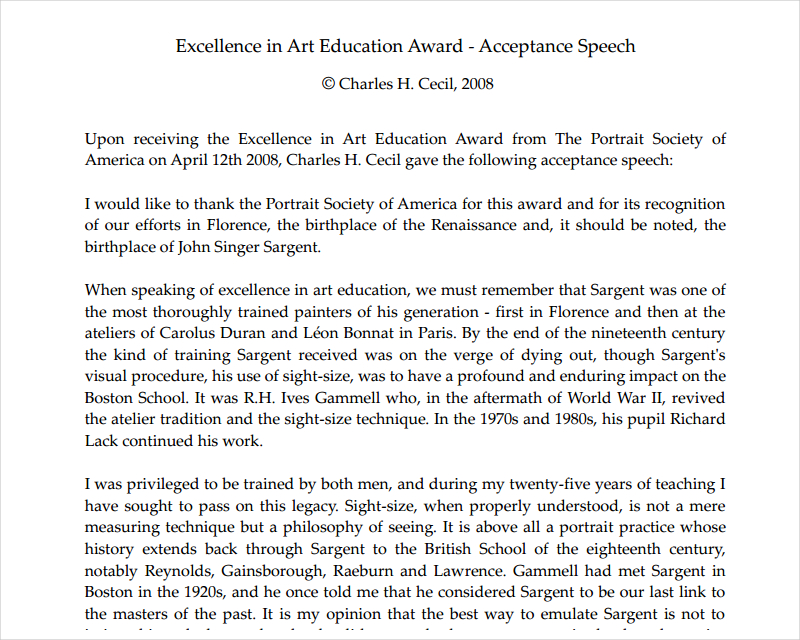
Size: 56.8 KB
Service Award Acceptance Speech
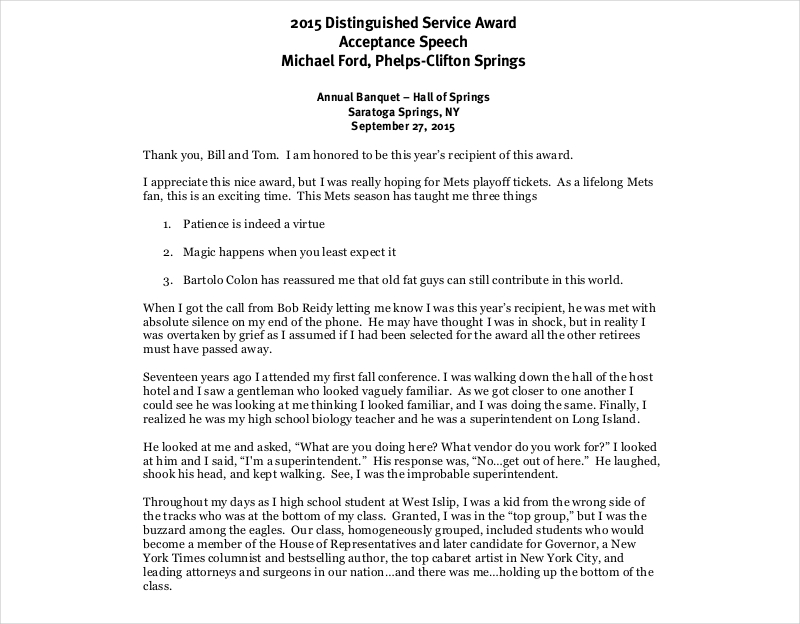
Size: 22.3 KB
Career Award Acceptance Speech
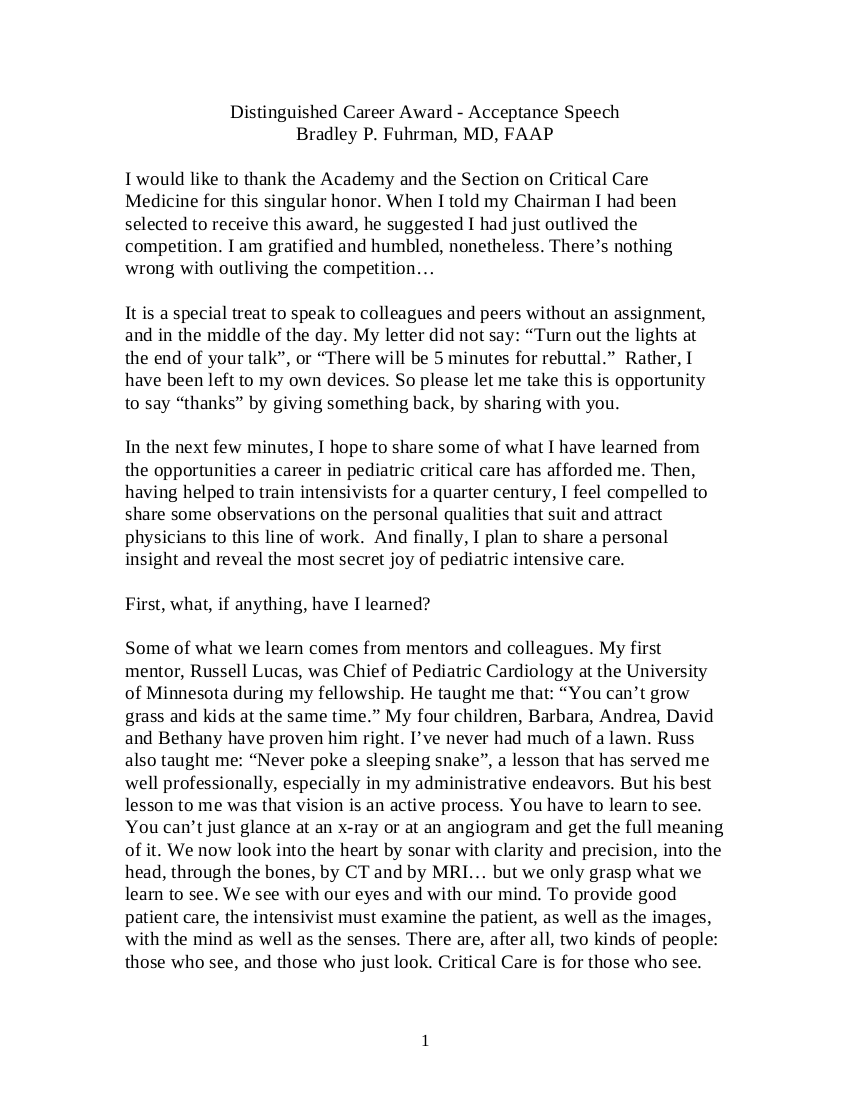
Size: 23.8 KB
Award Presentation Speeches
Sample award presentation speech.
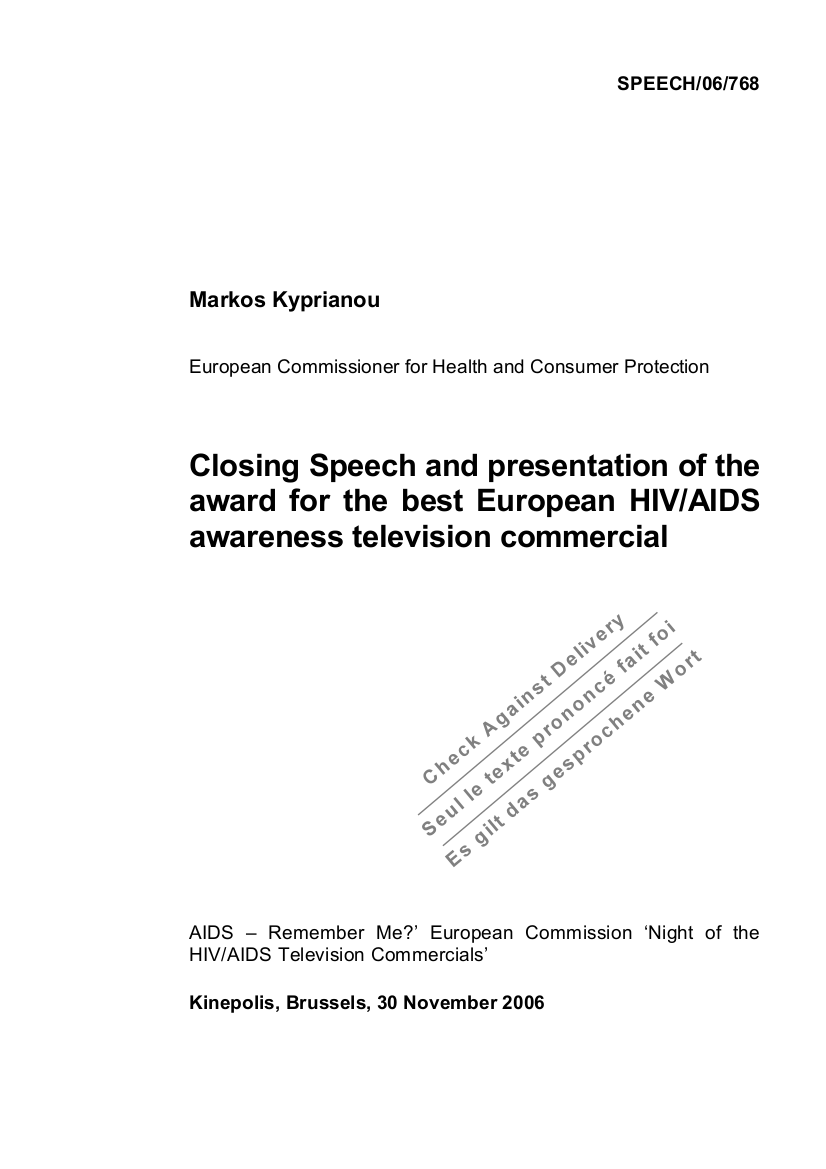
Size: 66.5 KB
Ceremony Award Presentation Speech
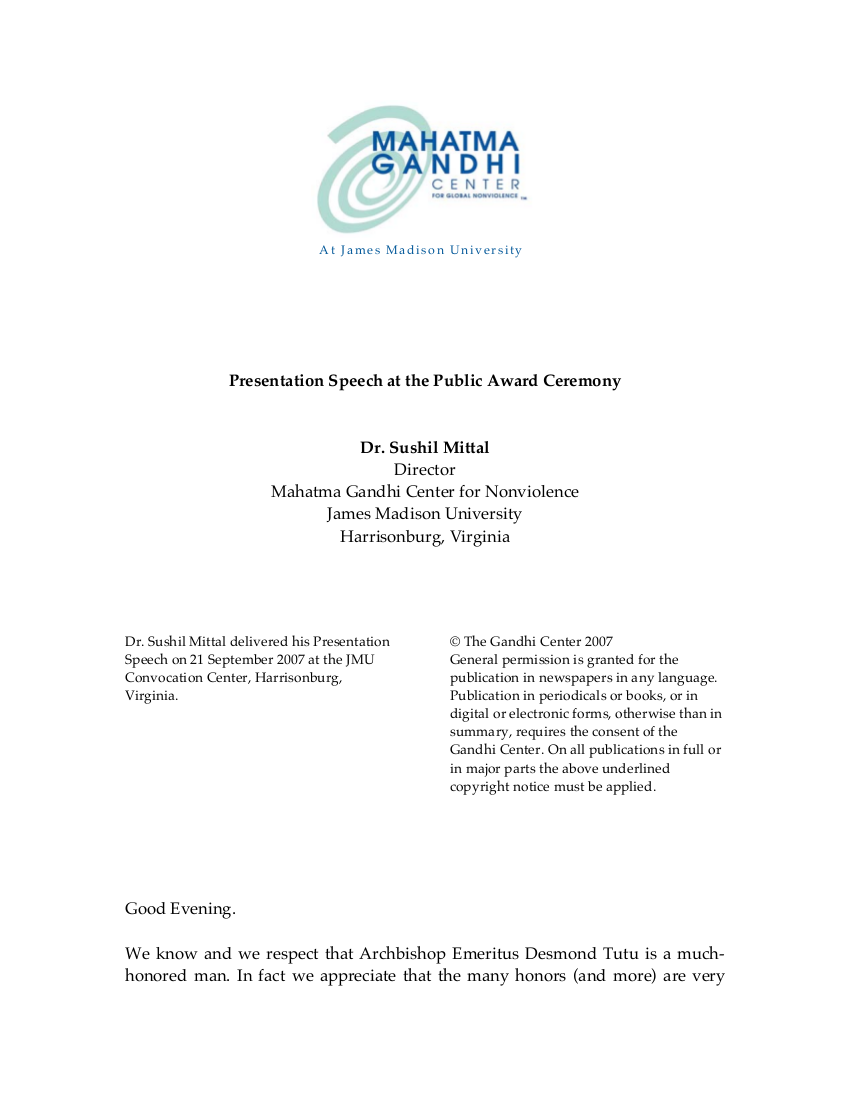
Size: 129.3 KB
Awards Ceremony Presentation Speech
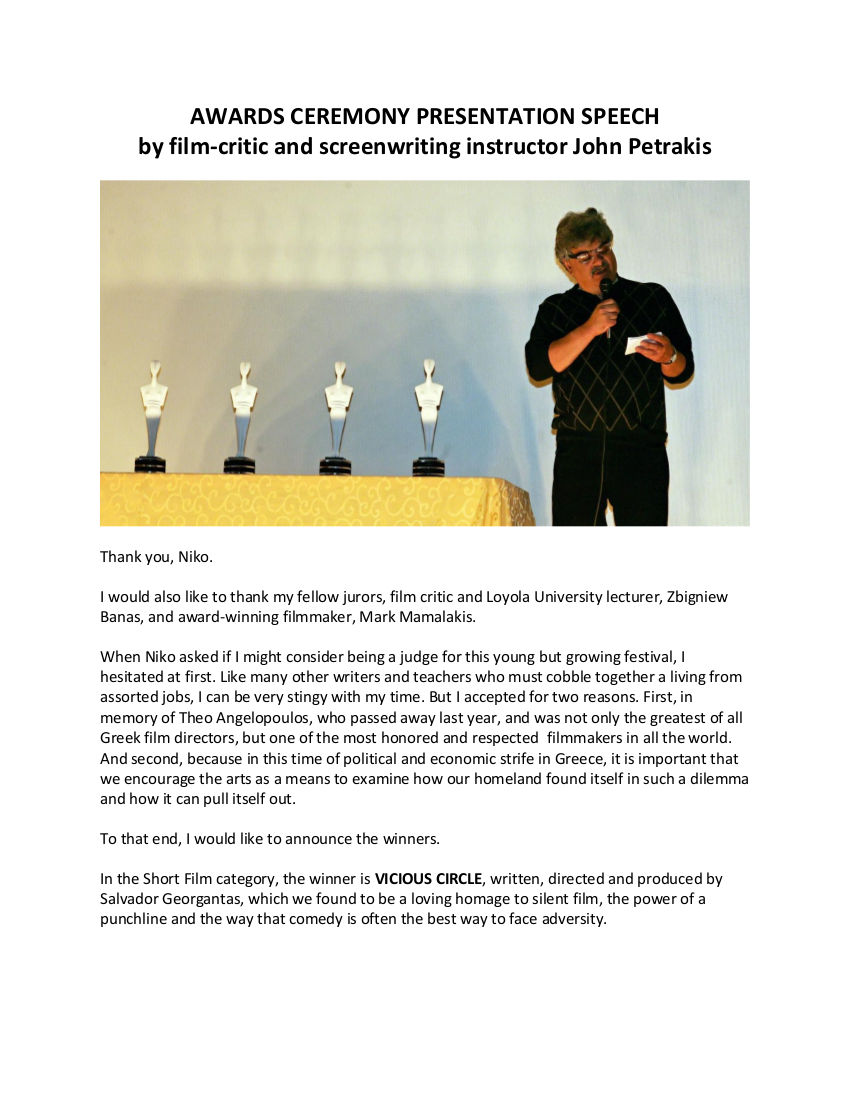
Size: 312.4 KB
Enginerring Heritage Award Presentation Speech
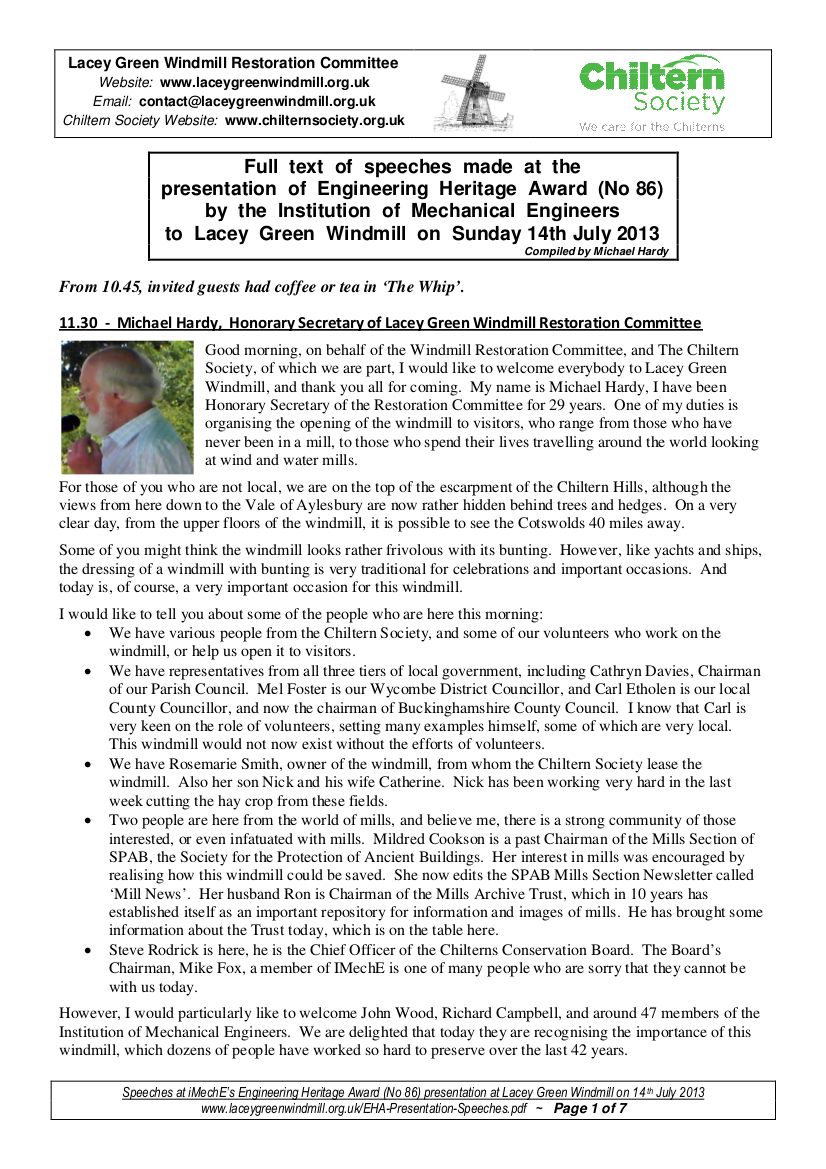
Size: 696.6 KB
Prize Presentation Speech
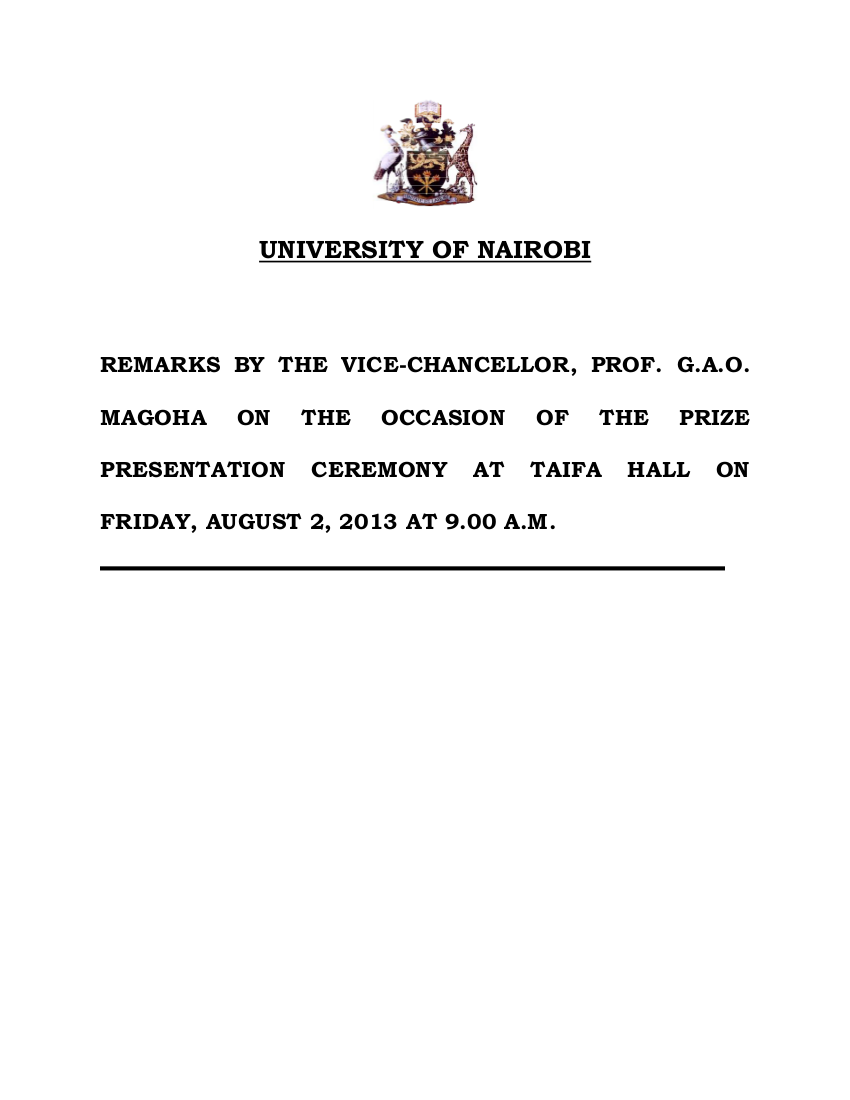
Size: 87.2 KB
What to Keep in Mind When Writing for Your Award Acceptance Speech
1. list down the people you have to give thanks.
The first step in writing your award acceptance speech is to simply list down. List down the people that have to be recognized for helping you in your path to achieving the award. This might sound like it is an obligation to mention people in order to thank them but when you feel so much gratitude in your heart for winning an award, you might want to thank even the cook that made the food you bought during the times when you were still at the process of aiming the award.
2. Reminisce your struggles and mini-victories before achieving the award
It is good to reminisce all your struggles and hardships while you were still aiming for the award. You can get sentimental and you might even cry in front of the audience but be reminiscing all the things you’ve done in order to achieve one of your goals can be fulfilling. It can also inspire people to continue paving the path towards achieving their goals when they are starting to lose hope.
3. Read other award acceptance speeches for inspiration
If you have a hard time thinking how to start your award acceptance speech, you can always get inspiration from previous award acceptance speeches that are similar to the kind of award that you will be receiving. This article provides you ten award acceptance speeches you can get inspiration from and you can also search for more on the internet.
High School Science Award Presentation Speech

Size: 4.2 KB
Fund Awards Presentation Speech
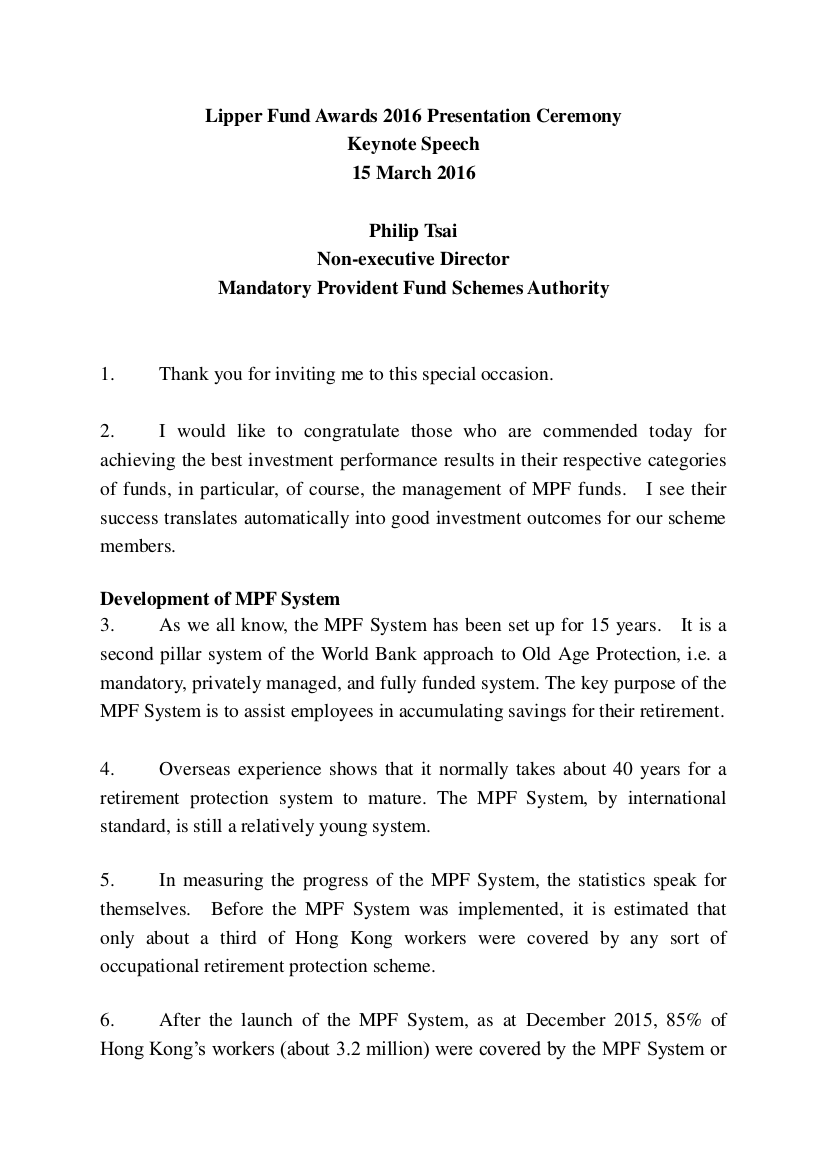
Size: 167.1 KB
Presentation Speech and Script for Emcee
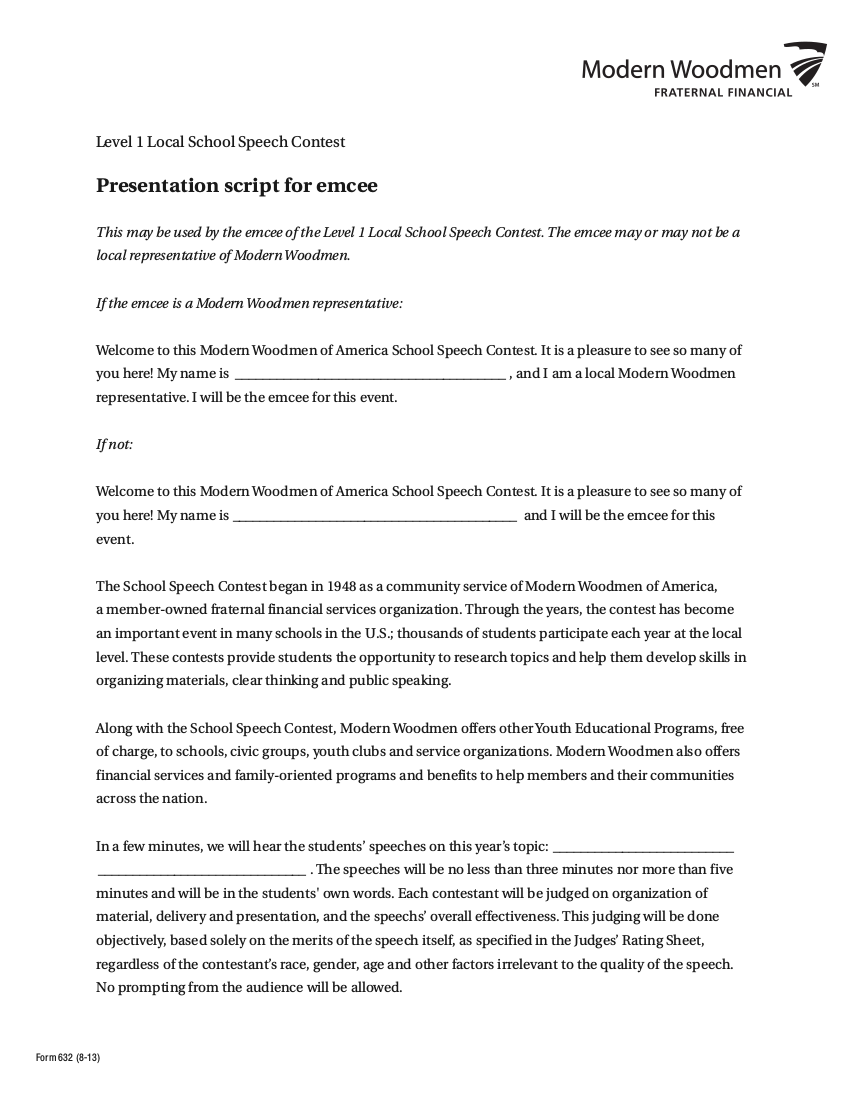
Size: 45.6 KB
Principal’s Presentation of Award Speech to Graduates
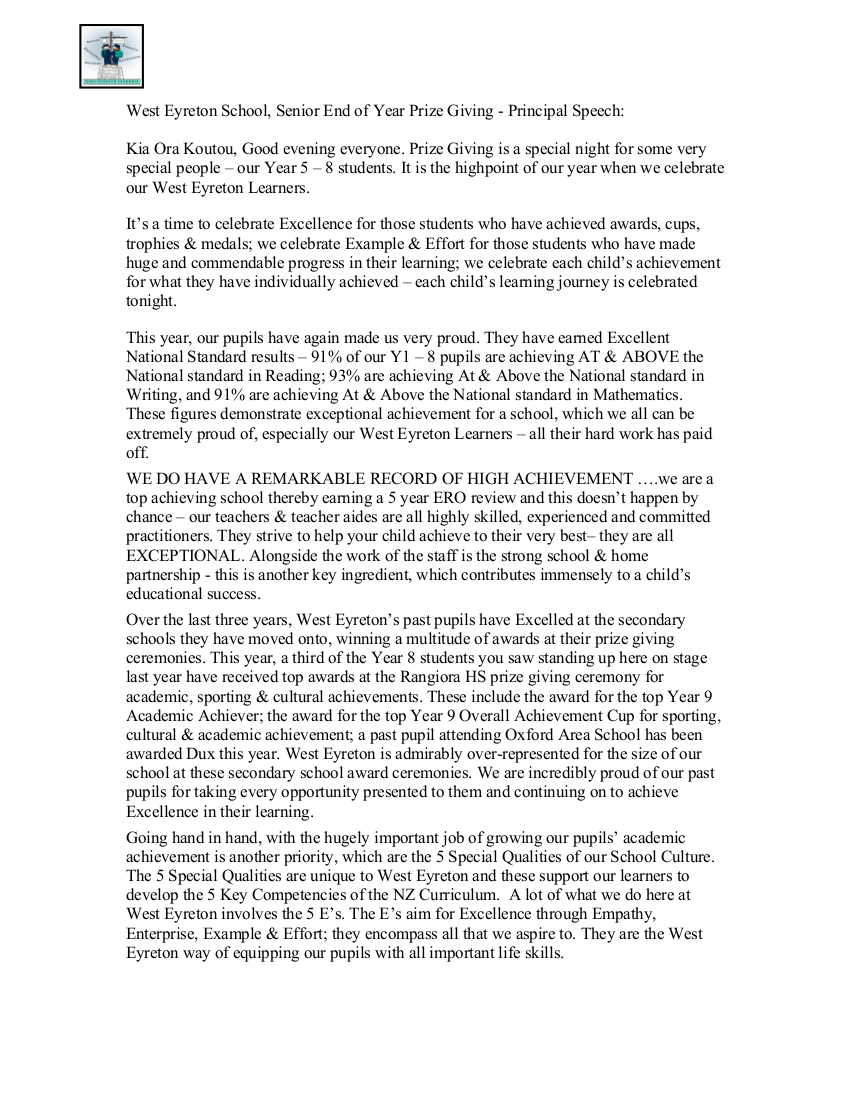
Size: 384.5 KB
Presentation of Award Speech to Parent and Learners
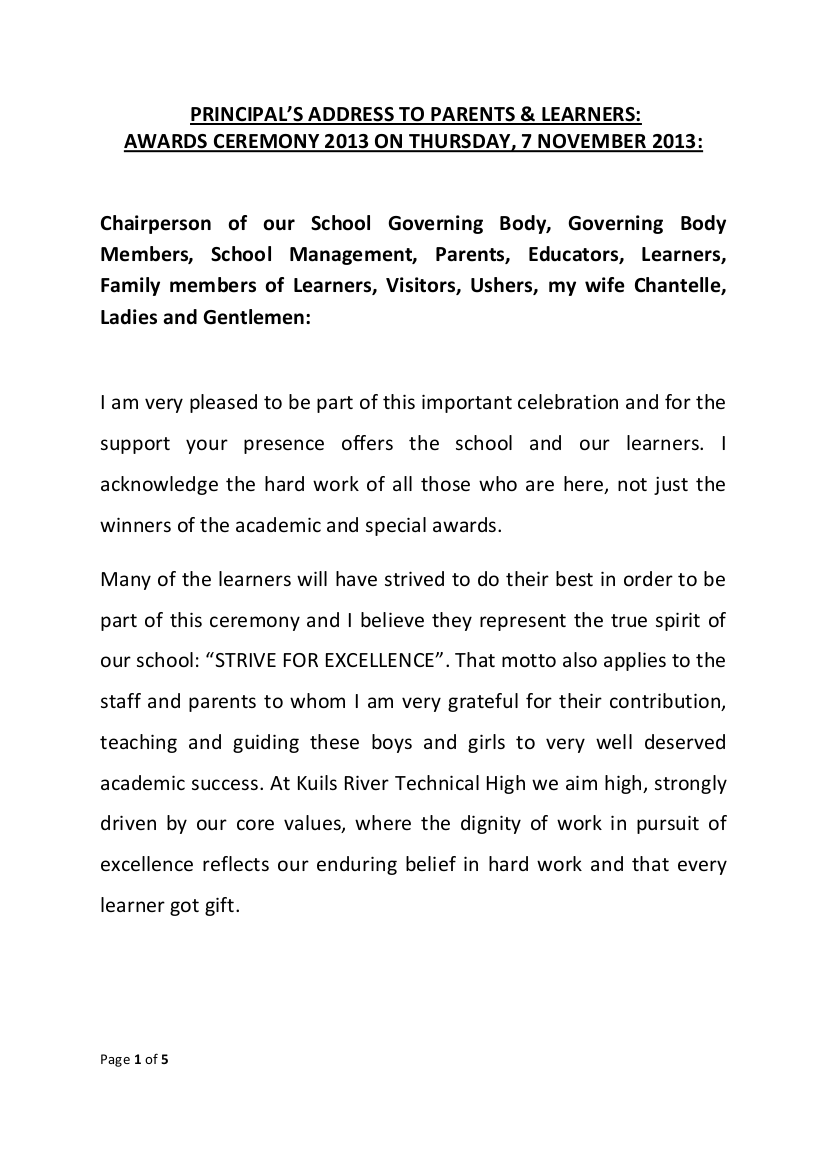
Size: 372.7 KB
Tips for Delivering Your Award Acceptance Speech
To be recognized for your all your hardships is the best feeling in the world but not all people are actually aiming to deliver an award acceptance speech. Here are some tips that can help you in achieving that perfect award acceptance speech delivery that your audience might think that you need another award for it.
1. Just keep it short and simple. Award acceptance speeches are not necessarily long. You just have to be straight to the point in thanking the people you need to be thinking and if there are a lot, just give them a general term like family, friends, and colleagues.
2. Just keep on practicing especially if you already knew that you would be receiving an award. It reduces stress, anxiety, and any nervous feelings.
3. Keep in mind the purpose of an award acceptance speech an that is to give appreciation for having received the award
4. You can inspire and preach in your award acceptance speech but do not go overboard that you award acceptance speech would not anymore sound like an award acceptance speech.
5. Know beforehand that time limit given for every awardee so that you would know how long your speech should be and that you would not be able to have an overtime and steal other people’s time in delivering a speech.
6. Share how the award can change your life and whether you would keep on achieving similar awards in the future.
7. Like with any speeches, always add spices to your ending. You can end it with a bang, end with a quote to live by your audience, and you can also end it with another situation that would make the audience ponder. You can end it in whatever way you want as long as you do the most important thing–make your audience remember who you are and what you are capable of.
Text prompt
- Instructive
- Professional
Write an Award Speech for receiving a community service award.
Create an Award Speech for a sportsmanship trophy.
